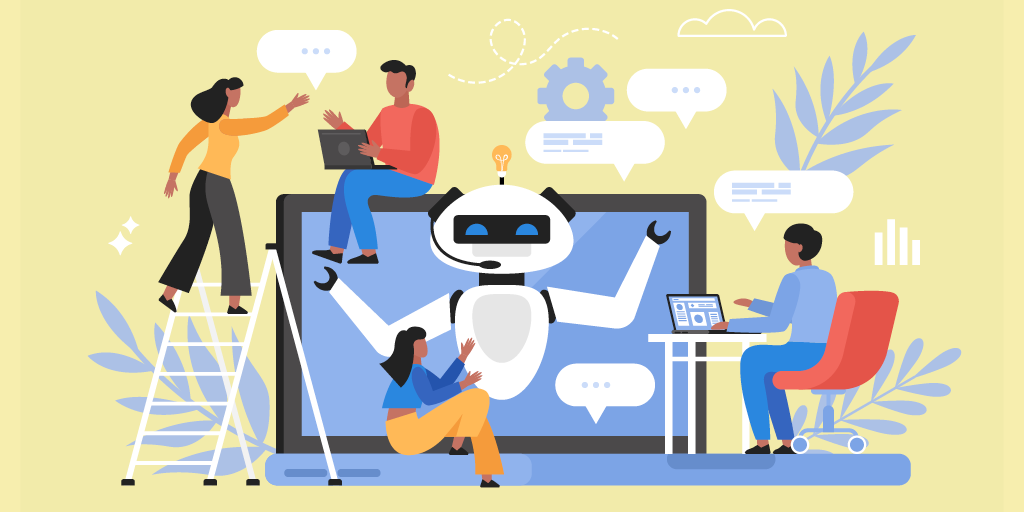Will Robots Destroy Your Job or Become a Co-Worker of the Future?

It’s Monday morning in 2030. You step into the office and your AI assistant, a holographic interface with a soothing voice, greets you with a personalised agenda for the day, your emails and tasks pre-prioritised. Over in procurement, a team is in the midst of a lively brainstorming session, but they’re not alone. An advanced AI system, projecting 3D market graphs and supplier data, collaborates with them. This isn’t a scene from a sci-fi movie, it’s a glimpse into the future of our workplaces. And in this imagined future, robots aren’t the ominous job snatchers. They’re your indispensable and super intelligent colleagues, tirelessly crunching numbers at astounding speed. But is that really what’s coming?
No one truly knows what lies ahead of us, but ideas like these have been stirring debates in boardrooms and cafes across the globe: Will robots and AI emerge as a threat to our jobs, or will they simply become invaluable allies in our professional lives?
This question becomes even more significant when we narrow our focus to procurement. How will AI and robotics redefine roles in procurement? Will they make our human skills obsolete, or will they enhance our capabilities?
As of right now, AI is integral to almost every sector. In procurement, its integration is particularly transformative. For example, AI systems are now capable of automating routine procurement tasks like processing orders and managing invoices – AI in some form or another is pretty much standard in modern cloud business systems.
Automation Impact
Automation might also be the biggest risk to jobs, with a PwC report suggesting that by the early 2030s, up to 30% of UK jobs could be impacted by automation. The report breaks down the impact into three waves:
- Algorithm Wave: Already underway, affecting 2-3% of jobs, particularly in sectors like finance, where tasks like credit scoring are being automated.
- Augmentation Wave: Expected to impact up to 20% of jobs by the late 2020s, as AI and robotics become more widespread.
- Autonomy Wave: Predicted to raise the potential job impact to 30% by the mid-2030s, with autonomous robots and vehicles becoming more common.
Notably, the report doesn’t anticipate mass unemployment, rather it suggests new jobs created by these emerging technologies could offset job losses.
We are also seeing AI being used to analyse vast data sets in order to generate insights into supplier performance, market trends, risk management, and to forecast supply and demand. Procurement’s ability to understand markets through data analysis and insight generation has always been a significant value-add. There are already existing services and tools that aid in these tasks, but AI will no doubt streamline them further.
Complex data analysis tasks that once took days or weeks can now be completed in minutes by generative AI and advanced language models, marking a substantial leap in efficiency and responsiveness in procurement.
AI-powered chatbots – like Chat GPT – and virtual assistants are providing real-time assistance to both buyers and suppliers. Specifically in procurement we are seeing AI being used to synthesise information – create dashboards, formulate plans, and draft reports for example.
Human-AI Collaboration
AI may not fully replace human insight, but it can efficiently produce outputs that complete a substantial portion of the groundwork. In this scenario, human intervention takes the form of adding context and setting precise prompts or question to improve AI’s ability to deliver tailored and insightful content.
Robotics, although less prevalent in the direct procurement process, plays a role in the broader supply chain too. Robotic systems in warehousing and logistics, for example, efficiently handle goods error-free, directly impacting the procurement cycle by ensuring timely and accurate delivery.
This is what we are seeing today in 2023. With every passing month, new innovations, technologies and use cases are emerging to further enhance AI and robotics role in the workforce and in procurement.
It’s not uncommon to feel a bit apprehensive about how AI and robotics will impact the workplace. We often hear how these technologies will take our jobs, leaving us unemployed in the reshuffle.
But history shows that technological advancements transform jobs rather than cut them out outright. And, in fact, it is far more likely that humans and AI will be complementary and more a tool that will change how we work. Just like desktop computers did so many years ago, these technologies will take on all those critical yet tedious tasks, giving us more time to focus on the bigger picture.
Will Robots Destroy Your Job?
We’re already seeing new jobs emerge, ones we couldn’t have ever imagined a decade ago. AI trainers, for instance, teach AI systems how to understand human nuances. Ads for prompt engineers are cropping up on employment sites illustrating the need for experts who can effectively communicate with and guide AI to perform tasks. As the workplace changes, the skills required for procurement professionals will change and we will all find ourselves adapting to new roles.
So, the question remains: Will robots destroy your job or become a co-worker of the future? The answer is yes and yes.
The influence of these technologies will be significant and multifaceted. They will replace many jobs and create new ones too. But many more will find their capabilities augmented through AI-assisted decision-making and strategy allowing them to engage in more meaningful work that demands emotional intelligence, creativity, and complex problem-solving.